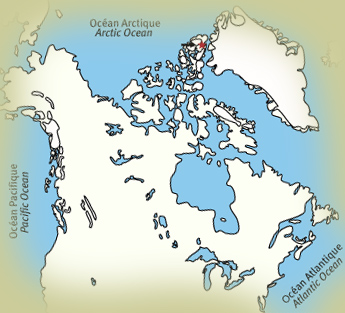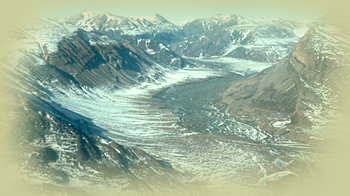|
First Peoples >
An Aboriginal Presence >
Our Origins >
Archaeology >
As the World Took Its Present Form >
Kettle Lake (High Arctic Canada, 4,500 years ago)
|
|
|
An Aboriginal PresenceOur OriginsArchaeology - As the World Took Its Present FormKettle Lake (High Arctic Canada, 4,500 years ago) - The first people to occupy the Canadian Arctic Islands and Greenland are known to archaeologists as Palaeoeskimos (ancient Eskimos). They came from Arctic Alaska between about 5,000 and 4,500 years ago. The remains of one of their small camps was found at Kettle Lake on Ellesmere Island, ringed by mountain glaciers, even today. Finds indicate that people lived in skin tents, held down by rocks and probably banked with snow. They cooked their meals over open fires in the stone-lined hearths that heated their dwellings. Animal bones show that people lived mainly on musk-oxen while at Kettle Lake. Nearby archaeological sites indicate that the same people also hunted seals, caribou and small game at different times of the year. Apparently lacking many of the inventions enjoyed by later Inuit - in particular snow houses and the blubber lamps necessary to heat them - early Palaeoeskimos must have had extremely difficult lives. 
Extent of glaciation, 5,000 years ago
"The dialogue with the spirit nations has not been abandoned... However, new elements have been incorporated into our [Aboriginal] concept of the past. Included in that list is the discipline of archaeology. Its methods have been successfully added to our efforts to better understand the world our ancestors inhabited." Eldon Yellowhorn, Peigan Nation, 2002 Debert (Atlantic Canada, 11,000 years ago) Grant Lake (west of Hudson Bay, about 8,000 years ago) Kettle Lake (High Arctic Canada, 4,500 years ago) | ||
